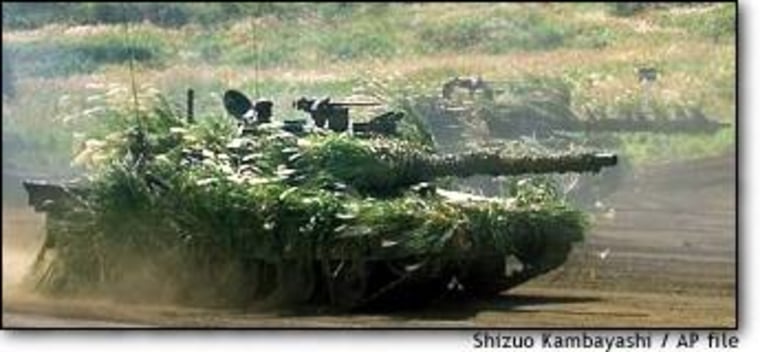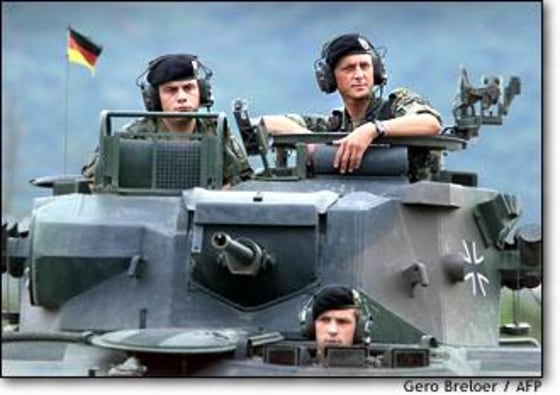German troops and armor are on the move in the Balkans, and Berlin says its forces may soon engage the enemy in the Middle East. Across the globe in Asia, meanwhile, Japanese warships carrying missiles and ammunition are preparing to set sail for the Indian Ocean. It’s a dispatch that could been written in 1941. But all these things are happening today as part of an enormous reordering of the world’s priorities and political dynamics in the wake of the Sept. 11 attacks on America.
Led for the first time by two men with no memory of World War II, both Germany and Japan took steps in the past month to loosen the legal and constitutional restraints on military action imposed on them by the victorious Allies in the late 1940s.
As recently as five years ago both nations still forbade their military from sending troops into war zones, reserving them strictly for homeland defense. But the wars of the 1990s — first in the Persian Gulf, then in Bosnia and Kosovo — have chipped away at the pacifist stance of both nations.
Now, both are on the verge of what German Chancellor Gerhard Schroeder called “a new international responsibility.”
These moves are taking part against a larger backdrop of redrawn alliances, rethought views on the United States and redefined national interests. Nations as diverse as Russia, India, Switzerland, Sweden, South Africa and Ireland - some of them charter members of the “Non-Aligned Movement” - have dropped long-standing criticism of American actions abroad and lent support to the efforts to oust the Taliban regime in Afghanistan and the extremists it harbors.
But in international politics, as in physics, every action has an equal and opposite reaction. The implications of a newly assertive, remilitarized Japan is of deep concern to its Asian neighbors — South Korea and China, in particular. And while Germany’s NATO and EU membership has helped ease its neighbors through the kinds of visceral fears expressed in Asia, Berlin’s new ambitions will certainly change the dynamic within NATO, where Britain and France traditionally have set the tone.
END OF AN ERA
This week, Schroeder, born in 1944 to a soldier who died in the final months of World War II, declared the postwar strictures on its military “irrevocably over.”
“Through the help and solidarity of our American and European friends, we were able to overcome the consequences of World War II. We Germans now have an obligation to meet our new responsibilities,” Schroeder said.
Since the Sept. 11 attacks, Germany has agreed to take command of the U.N. peacekeeping force in Macedonia and to help replace American and British peacekeepers in Kosovo and Bosnia. Germany also pledged to send troops and warships to fight with U.S. and British forces in Afghanistan.
Perhaps even more significant has been the public’s reaction. A poll by Germany’s ZDF network found that 65 percent of people questioned between Oct. 8 and 11 said they were in favor of German involvement in the military strikes against Afghanistan. That number shot up from 37 percent in the immediate aftermath of the attacks, perhaps reflecting approval of the slow approach the United States adopted.
MAKING UP GROUND
InsertArt(1357392)In Japan, where the military is still known as the Self Defense Forces, public support is more divided and constitutional restrictions on actual combat continue to have wide political support.
Japanese governments in recent years have been increasingly uncomfortable with this straightjacket, citing the 1996 sarin gas attack on Tokyo’s subways, the increasing power of China, and ballistic missile tests by North Korea. Increased defense spending has been the main response to these challenges: Japan now ranks second in the world in military dollars, behind only the United States.
But the government of Prime Minister Junichiro Koizumi is dearly hoping to avoid the kind of dilemma Japan faced during the Gulf War. Despite the fact that Japan got more of its oil from the gulf than any other country, no Japanese forces took part. Tokyo did agree to pay $12.7 billion of the total cost of $61 billion for the war. As one Japanese newspaper put it at the time, “The world are our mercenaries.” Since then, Japan has amended its constitution to allow its troops to take part in U.N. peacekeeping forces, and it deployed some troops to East Timor, which broke away from Indonesia after a referendum.

ANTI-TERRORISM MEASURE?
But Koizumi proposes to go much further. The “anti-terrorism” bill proposed by his government would allow Japan’s large navy to ferry missiles, ammunition and other supplies from American bases in East Asia to the war theater. The government also wants to deploy Japanese troops to help guard American military facilities on Japanese soil, further freeing up American troops for combat.
While this may seem a relatively small contribution, it would be the largest Japanese military operation since the end of World War II. More importantly, it stretches further the interpretation of the “one nation pacifism” enshrined in the constitution that Gen. Douglas MacArthur bestowed on the country.
“If we say ‘No, we can’t do this,’ ” Koizumi told parliament upon introducing the bill earlier this month, “Japan will never get respect in the international community.”
THERE GOES THE NEIGHBORHOOD
To some in Asia, however, this looks like opportunism on the part of a government that has already angered neighboring states by glorifying the exploits of the Japanese military in World War II.
Shortly after taking office last summer, Koizumi visited the Yasukuni shrine to Japan’s war dead, a national symbol of militarism in a society generally happy not to discuss the war crimes of its wartime generation. Add the continuing disputes with China and South Korea over Japanese school texts, which whitewash many of these crimes, and East Asia is in no mood to give Japan the benefit of the doubt.

China fears the precedent set in coming to America’s aid in Afghanistan might be repeated in a future conflict over Taiwan — a scenario that Japanese policy always has been deliberately vague about. Certainly, even China knows U.S. bases in Japan would be used in the defense of Taiwan. But the role of Japan’s own military has never been spelled out.
HISTORY QUIZ
More generally, Japan has done a very poor job over the years convincing its neighbors that it regrets the brutality of its imperial forces during World War II.
Japan’s text books continue to omit mentions of the great civilian massacres perpetrated by the army in China and the Philippines, the brutality of Japanese POW camps and the recent revelation that Japan used biological warfare against Chinese civilians in Manchuria.
The furor awaiting Koizumi on Monday when he visits South Korea, which Japan ruled brutally as a colony for the first half of the 20th century, is an excellent example. South Korea’s government has demanded Koizumi renounce his visit to the Yasukuni shrine and also take steps to address the problem with the nation’s history books.
“Without his true apology, Prime Minister Koizumi will never be welcomed by the people of South Korea,” ruling party parliamentarian Kim Young-jin told a news conference on Friday.
It’s a message the Germans got long ago.
